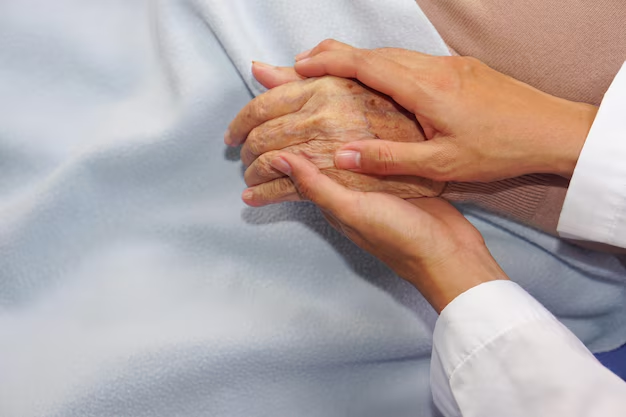Your Guide to Do You Die From Parkinson's Disease
What You Get:
Free Guide
Free, helpful information about Parkinsons FAQ and related Do You Die From Parkinson's Disease topics.
Helpful Information
Get clear and easy-to-understand details about Do You Die From Parkinson's Disease topics and resources.
Personalized Offers
Answer a few optional questions to receive offers or information related to Parkinsons FAQ. The survey is optional and not required to access your free guide.
Understanding the Impact of Parkinson's Disease on Life Expectancy
It's a question that weighs heavily on the minds of those recently diagnosed or who have a loved one affected: Can people die from Parkinson's disease? The answer isn't straightforward. Parkinson's disease itself is not directly fatal, but its complex symptoms can lead to complications that may significantly impact life expectancy.
Complications and Challenges
Parkinson’s Disease is a progressive neurodegenerative disorder that primarily affects movement. It can also introduce a range of other health issues over time. While individuals do not succumb directly to Parkinson's disease, the complications stemming from its symptoms often lead to life-threatening situations. These can include:
- Aspiration Pneumonia: Difficulty in swallowing (dysphagia) increases the risk of inhaling food or liquids into the lungs, leading to pneumonia.
- Falls and Injuries: Tremors, stiffness, and balance issues can cause falls, leading to serious injuries such as fractures or head trauma.
- Cognitive Decline: Parkinson's is often associated with cognitive impairments and dementia, which can complicate patient care and management.
- Infections and Cardiovascular Problems: Weakened physical conditions can make individuals more susceptible to viruses, and the stress on the body can exacerbate heart conditions.
Despite these challenges, many people with Parkinson's live for years, even decades, after diagnosis. Effective management of symptoms and lifestyle adjustments play crucial roles in prolonging life and maintaining quality of life.
Finding the Right Support
Navigating life with Parkinson's disease can be overwhelming, especially given the potential financial burdens. From medical bills to specialized home care, expenses can accumulate swiftly. Fortunately, there are numerous resources and programs designed to alleviate these pressures:
- Government Assistance Programs: Many countries offer assistance such as Medicare, Medicaid, or specific disability benefits to help cover medical expenses.
- Financial Planning: Professional financial advisors can assist in managing costs related to long-term care and home modifications.
- Non-Profit Organizations: Groups such as the Michael J. Fox Foundation and the Parkinson's Foundation offer support, advocacy, and sometimes financial grants to those in need.
Understanding these options can greatly reduce the financial stress associated with managing Parkinson's disease, allowing individuals to focus more on their health and well-being.
Tips for Families and Caregivers
Supporting a loved one with Parkinson's involves balancing emotional and logistical challenges. Here are some tips to help:
- Educate Yourself: Knowledge is power. Understanding the disease process, symptoms, and treatments can equip you to provide better care.
- Seek Support: Join caregiver support groups. Sharing experiences and advice can be incredibly comforting and useful.
- Plan Ahead: Financial and healthcare planning can help prepare for the future and the potential higher costs of care as the disease progresses.
By proactively engaging with support and resources, caregivers can significantly enhance the quality of life for their loved ones.
Empower Your Journey with Essential Resources
With the right approach and support, managing Parkinson's disease's impact on life expectancy and quality of life becomes more achievable. Here’s a handy list of programs and solutions that could offer much-needed relief:
- 🚑 Medicare/Medicaid: Covers a range of health services, including hospital stays and some at-home care.
- 💸 Social Security Disability Insurance (SSDI): Financial support for those unable to work due to Parkinson’s.
- 🏥 Veterans Affairs (VA) Benefits: For veterans, providing access to specialized healthcare and support services.
- 📞 Parkinson’s Foundation Helpline: Offers helpful advice and connections to local community resources.
- 💡 Non-Profit Grants: Organizations like the Michael J. Fox Foundation provide funding for innovative caregiving solutions.
Staying informed and seeking assistance can significantly lighten the load, ensuring focus remains on what truly matters: health, longevity, and quality of life.
What You Get:
Free Parkinsons FAQ Guide
Free, helpful information about Do You Die From Parkinson's Disease and related resources.

Helpful Information
Get clear, easy-to-understand details about Do You Die From Parkinson's Disease topics.

Optional Personalized Offers
Answer a few optional questions to see offers or information related to Parkinsons FAQ. Participation is not required to get your free guide.


Discover More
- Are There Environmental Causes Of Parkinsons
- Can Alcohol Cause Parkinson's
- Can Concussions Cause Parkinson's
- Can Concussions Cause Parkinson's Disease
- Can Dogs Get Parkinson's Disease
- Can Dogs Get Parkinsons
- Can Dogs Have Parkinson's
- Can Dogs Have Parkinson's Disease
- Can Females Get Parkinson Disease
- Can Head Trauma Cause Parkinson's
